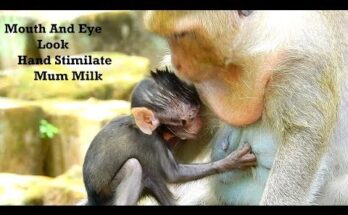
In the lush green depths of the jungle, where sunlight filters through thick foliage and every sound carries the heartbeat of the wild, a quiet story unfolded—one not of predators or chase, but of patience, pain, and profound love. Amidst a canopy alive with bird calls and the rustle of swinging limbs, a tiny monkey named Floran sat huddled, her eyes swollen nearly shut, her world reduced to shadows, scent, and touch.
It had begun innocently enough—just days earlier, Floran had been full of youthful energy. Curious and adventurous, she had darted after a butterfly, its iridescent wings flickering like a promise of magic. But her chase brought her too close to a dense thicket of thorny branches. In a flash of miscalculated motion, a sharp thorn scratched across her delicate face, brushing dangerously close to both eyes.
What started as irritation rapidly worsened. The next morning, her eyes were nearly sealed with swelling, raw and red. Pain clouded her once-bright gaze. Every blink burned. Every squint made her flinch. The jungle, once a playground, had become a confusing blur of light and sound she could barely process.
But she wasn’t alone.
Her mother, gentle yet fierce, immediately recognized the change. From that moment forward, she refused to leave Floran’s side. The older monkey had no medicine to give, no magic cure—but she had something far more powerful. She had patience. She had presence. She had love.
She groomed Floran constantly, licking the fur gently near her eyes, cleaning her with slow, deliberate strokes that spoke of comfort and reassurance. At times, Floran whimpered softly, pressing her head into her mother’s chest. There were no words between them—none were needed. In the language of touch and closeness, everything was said.
As midday sun bathed the treetops in golden light, the mother plucked a soft, ripe fig from a low branch. Carefully, she placed it in Floran’s tiny hands. The baby sniffed it hesitantly, then began to nibble. The juice dribbled down her chin, and for a fleeting moment, a spark of contentment softened her pained face. Though her eyes still throbbed, the sweetness of the fruit, the rhythm of chewing, and the closeness of her mother brought relief that medicine alone could not provide.
The rest of the troop went about their day—some aware, some indifferent. A few curious juveniles approached, drawn by the sight of the injured infant. One offered a crumpled leaf; another tried to initiate play. But the mother kept Floran close, shielding her from too much stimulation, too much noise. The message was clear: Let her heal. Let her rest. I will protect her.
And so the hours passed—not in excitement, but in quiet courage.
The jungle, for all its chaos, held this space of stillness. Amid swinging vines and scampering feet, two figures sat motionless: a mother guarding her child through a slow recovery, offering not grand gestures, but small, persistent acts of love. When Floran shifted, the mother adjusted. When she cried, the mother soothed. When she slept, the mother watched.
Days like this blur together in the wild. Time is measured not by clocks, but by healing. By breaths. By how many bites a baby monkey can eat on her own. And slowly, the swelling would subside. The forest would become clear again. The butterflies would return, and maybe, just maybe, Floran would chase them again—wiser now, but still full of wonder.
But for now, her world was smaller. It was a soft patch of forest floor. It was the scent of figs. It was the heartbeat of her mother, constant and steady like a lullaby. And in that place—in that bond—was safety, was recovery, was love.
Because in the wild, survival doesn’t always roar. Sometimes, it whispers. It cradles. It stays.


